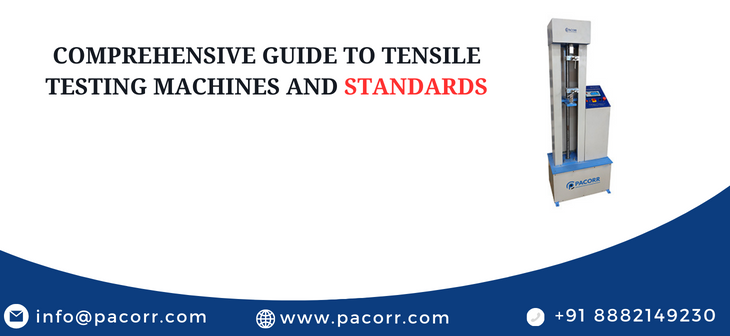
 Tensile testing machines are at the forefront of this quest, providing crucial data that helps in the design, development, and validation of materials across industries. From automotive to aerospace and construction, the tensile strength tester is a pivotal tool in a material engineer's arsenal. This guide will introduce you to the sophisticated world of tensile testing machines, focusing on their types, functionalities, and the relevant standards like ASTM D638 and ISO 527-2, particularly highlighting how Pacorr's state-of-the-art equipment sets industry benchmarks.
Tensile testing machines are at the forefront of this quest, providing crucial data that helps in the design, development, and validation of materials across industries. From automotive to aerospace and construction, the tensile strength tester is a pivotal tool in a material engineer's arsenal. This guide will introduce you to the sophisticated world of tensile testing machines, focusing on their types, functionalities, and the relevant standards like ASTM D638 and ISO 527-2, particularly highlighting how Pacorr's state-of-the-art equipment sets industry benchmarks.
They assess the tensile strength of various materials, a fundamental property crucial for application in high-stress environments. These machines apply a tensile force to a sample until it fails, providing insight into the material's strength, ductility, and deformation capacity. This article delves into the nuances of tensile testing machines, exploring different types, their functions, and the standards governing their usage, such as ASTM D638 and ISO 527-2, with a special focus on Pacorr’s innovative solutions.
Understanding Tensile Testing Machines
What is a Tensile Testing Machine?
A tensile testing machine, also known as a tensile test machine or a tensile strength tester, is an apparatus used in the mechanical testing of materials. It measures the force required to elongate a specimen to its breaking point, which helps determine material properties like tensile strength, maximum elongation, and reduction in area. From metals and plastics to textiles and components, these machines are crucial for quality control and regulatory compliance.
Types of Tensile Testing Machines
- Single-Column Tensile Testers: Ideal for lighter, less strenuous tests, particularly useful in industries dealing with textiles and non-metals.
- Dual-Column Tensile Testers: These are suited for a broader range of materials, including metals, and can handle higher forces.
- Horizontal Tensile Testers: Used for long samples that are difficult to test vertically, such as cables and wires.
The Importance of Standards in Tensile Testing
ASTM D638 and ISO 527-2 Explained
- ASTM D638: This standard outlines the procedures for testing the tensile properties of plastic materials. It specifies sample dimensions, test speed, and the type of grip required.
- ISO 527-2: Similar to ASTM D638 but with a global perspective, this standard focuses on determining the tensile properties of plastics by conditions of test for plastic sheets and films.
Compliance with these standards ensures reliability and uniformity in test results, making them critical for global trade and quality assurance.
Pacorr’s Tensile Testing Machines: Innovations and Advantages
Advanced Features and Benefits
Pacorr stands out in the tensile testing market with its cutting-edge technology and user-friendly designs. Their machines are equipped with features like:
- Precision Load Cells: For accurate force measurement.
- Robust Construction: Ensures durability and long-term use.
- Digital Control Systems: Allow for precise control and easy monitoring of test parameters.
Application Across Industries
Pacorr’s tensile testing machines are versatile, catering to various sectors:
- Automotive: Testing seat belts, airbags, and other components that require stringent safety standards.
- Aerospace: For materials that must withstand extreme conditions.
- Packaging: Ensures that packaging materials can handle stress during transport and storage.
User Experience with Pacorr’s Equipment
Testimonials and Case Studies
Many Pacorr customers report enhanced testing efficiency and reliability. Case studies highlight significant improvements in workflow and material compliance, underscoring Pacorr's commitment to excellence and innovation in tensile testing solutions.
Future Trends in Tensile Testing
Innovations on the Horizon
The future of tensile testing looks promising with the integration of AI and machine learning, where predictive analytics can foresee material behaviors under various conditions, leading to more rapid product development cycles and improved material safety.
In wrapping up, the significance of tensile testing in modern manufacturing cannot be overstated. With stringent standards like ASTM D638 and ISO 527-2 in place, and innovations from companies like Pacorr, industries can achieve greater reliability and product safety. As we look forward, the evolution of tensile testing technologies will continue to play a pivotal role in material science, pushing the boundaries of what's possible in manufacturing and product development.
For more insights into material testing and to discover how Pacorr’s solutions can enhance your operations, visit Pacorr’s official website.
FAQs
Q: Why is tensile testing important?
A: Tensile testing helps predict how a material will behave under different types of forces, ensuring that only the most robust materials make it into critical applications.
Q: What materials can be tested with a tensile testing machine?
A: Everything from metals, plastics, textiles, to components used in various industries can be tested for tensile strength.
Q: How does compliance with ASTM D638 and ISO 527-2 impact my business?
A: Compliance ensures that materials meet

